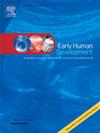Neurodevelopmental effects of opioids in preterm infants – A systematic review and meta-analysis of randomised and observational studies
IF 2
3区 医学
Q2 OBSTETRICS & GYNECOLOGY
引用次数: 0
Abstract
Background
Opioids are commonly used to reduce pain and distress in preterm infants in neonatal intensive care units. However, there is a concern that exposure to opioids may adversely affect their neurodevelopment.
Methods
We conducted a systematic review of randomised controlled trials (RCTs) and observational studies (OSs) to investigate the effect of opioids on neurodevelopmental outcomes in preterm infants. We followed the Cochrane Collaboration guidelines and those for the synthesis of OSs. Results were pooled when at least two studies reported the outcome. We performed a qualitative synthesis for data not suitable for pooling.
Results
The systematic review included 21 records of 16 studies (13 OSs [n = 2993] and three RCTs [n = 180]). Quantitative analysis was possible for ten studies. The certainty of evidence was ‘very low’ for all outcomes. The risk of neurodevelopmental impairment, the primary outcome, was not increased in opioid exposed preterm infants (OR: 1.15, 95 % CIs: 0.64, 2.08, 5 OSs, n = 697 and OR: 1.29, 95 % CIs: 0.56, 3.01, 2 RCTs, n = 151). There was no increase in adverse secondary outcomes apart from lower motor scores at 2–3 years of age (MD: -6.19, 85 % CI: −11.26, −1.11, 4 OSs, n = 692) in the opioid group. On qualitative analysis of adjusted data, opioids showed variable effects: ten reports suggested harm, two suggested benefit and two suggested no impact, while the results were inconsistent in three reports.
Conclusion
The current evidence for the effect of opioids on neurodevelopmental outcomes of preterm infants is inconclusive and of very low certainty.
阿片类药物对早产儿神经发育的影响——随机和观察性研究的系统回顾和荟萃分析
背景:在新生儿重症监护病房,阿片类药物通常用于减轻早产儿的疼痛和窘迫。然而,人们担心接触阿片类药物可能会对他们的神经发育产生不利影响。方法对随机对照试验(RCTs)和观察性研究(OSs)进行系统回顾,探讨阿片类药物对早产儿神经发育结局的影响。我们遵循Cochrane协作的指导方针和那些OSs合成的指导方针。当至少有两项研究报告了结果时,结果被合并。我们对不适合合并的数据进行了定性综合。结果系统评价纳入16项研究的21条记录(13项os [n = 2993], 3项rct [n = 180])。对10项研究进行了定量分析。所有结果的证据确定性都“非常低”。阿片类药物暴露的早产儿的主要结局神经发育障碍的风险没有增加(OR: 1.15, 95% ci: 0.64, 2.08, 5个os, n = 697; OR: 1.29, 95% ci: 0.56, 3.01, 2个rct, n = 151)。阿片类药物组除了2-3岁时较低的运动评分外,不良次要结局没有增加(MD: -6.19, 85% CI: - 11.26, - 1.11, 4 os, n = 692)。在调整数据的定性分析中,阿片类药物显示出不同的影响:10份报告认为有害,2份报告认为有益,2份报告认为没有影响,而3份报告的结果不一致。结论目前关于阿片类药物对早产儿神经发育结局影响的证据尚无定论,而且确定性很低。
本文章由计算机程序翻译,如有差异,请以英文原文为准。
求助全文
约1分钟内获得全文
求助全文
来源期刊

Early human development
医学-妇产科学
CiteScore
4.40
自引率
4.00%
发文量
100
审稿时长
46 days
期刊介绍:
Established as an authoritative, highly cited voice on early human development, Early Human Development provides a unique opportunity for researchers and clinicians to bridge the communication gap between disciplines. Creating a forum for the productive exchange of ideas concerning early human growth and development, the journal publishes original research and clinical papers with particular emphasis on the continuum between fetal life and the perinatal period; aspects of postnatal growth influenced by early events; and the safeguarding of the quality of human survival.
The first comprehensive and interdisciplinary journal in this area of growing importance, Early Human Development offers pertinent contributions to the following subject areas:
Fetology; perinatology; pediatrics; growth and development; obstetrics; reproduction and fertility; epidemiology; behavioural sciences; nutrition and metabolism; teratology; neurology; brain biology; developmental psychology and screening.
 求助内容:
求助内容: 应助结果提醒方式:
应助结果提醒方式:


